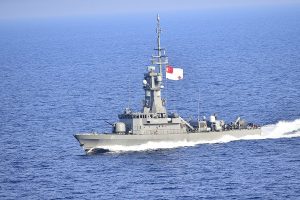Last month leading Singaporean and Israeli defense firms announced the formation of a Singapore-based joint venture to develop and market advanced missile systems, including a new anti-ship cruise missile.
Singapore Technologies Engineering (ST) and Israel Aerospace Industries (IAI) announced a new Singapore-based joint venture in July called Proteus Advanced Systems in July. The new venture will develop and market advanced naval missile systems.
Singapore and Israel have a long history of defense cooperation dating to Singapore’s independence from Malaysia in the 1960s. For many years the defense relationship between the two countries was kept secret out of concern for the perceptions of Singapore’s Muslim-majority neighbors.
The venture pairs ST’s land systems arm with IAI, which produces long-range tactical missiles and artillery rockets. The combination of ST’s ground-based platforms and IAI’s missile expertise suggests that the venture may offer mobile coastal defense systems for attacking warships at sea.
This capability is potentially highly attractive to Southeast Asian customers. The South China Sea is home to coastal states with multiple overlapping maritime claims and closely clustered disputed islands. Long-range mobile missile systems deployed in the region’s crowded littoral geography gives even relatively weaker states significant deterrent capability against more powerful naval powers such as China, whose warships would have to transit close to contested coastlines in a potential conflict.
ST Engineering and IAI may see an opportunity among Western Pacific nations that are concerned about balancing against China’s growing naval power and assertiveness but are wary of binding themselves too closely with the United States at it ratchets up its competition with China. The United States is embarking on an ambitious plan to develop land-based missile systems to deter China that were previously banned under Cold War-era arms control treaties. To be effective these missiles would need to be deployed on the territory of partner nations in the Western Pacific, but many partners and allies are reticent to accept systems that might make them potential targets in a competition between the United States and China.
Despite its close defense ties with the United States, late last year the Philippines declared its intention to purchase several batteries of BrahMos supersonic anti-ship cruise missiles for coastal defense. The BrahMos, a joint Indian and Russian product, is the world’s fastest anti-ship cruise missile currently in use.
One of ST’s North American subsidiaries, Halter Marine, is under contract to evaluate and likely produce the U.S. Navy’s next-generation submarine tracking ocean surveillance ships.

































